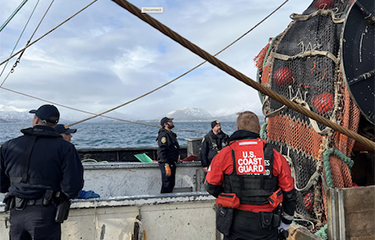Alaska charges vessel operator for using non-pelagic trawl gear

The U.S. state of Alaska filed criminal misdemeanor charges 12 May against a vessel operator for using non-pelagic trawl gear within the Kodiak, Alaska, groundfish registration area.
A multi-agency law enforcement team based off the U.S. Coast Guard Cutter Naushon boarded the trawler on 16 April and issued several significant fisheries violations.
“The trawl gear used in the area during the incident had attached chafing gear and chain rib lines suitable for fishing in contact with the seabed, all devices not authorized for legal pelagic trawl gear,” the U.S. Coast Guard said in a statement.
Prior to the boarding, NOAA officers notified the Naushon crew and Alaska Wildlife Troopers that a fishing vessel had been operating in the Barnabas bottom-trawl closure area, which is located on the south end of Kodiak Island. The Naushon crew boarded the 88-foot fishing vessel as it neared the city of Kodiak and discovered evidence of nonpelagic trawling inside the closure area, according to the Coast Guard.
The Coast Guard Cutter Naushon is a 110-foot patrol boat homeported in Homer, Alaska. The Coast Guard boarding team determined the fishing vessel was in violation for trawling in the Barnabas closure area while having a non-pelagic bottom trawl on board. The Coast Guard did not release the name of the vessel or operator.
"In response to the boarding, NOAA opened an investigation into the vessel for fishing in federal waters closed to non-pelagic trawl gear around Kodiak," National Oceanic and Atmospheric Administration Office of Law Enforcement Supervisory Enforcement Officer Phillip Null said.
The U.S. Coast Guard’s fisheries mission is to promote a level playing field in commercial fisheries, protect resources, and ensure safety of life at sea, but interagency collaboration is crucial to detecting and documenting violations in the complex geographic and regulatory landscape of Alaska’s commercial fisheries, according to Null.
“This violation is significant in the potential it has for negatively effecting important habitat,” Alaska Wildlife Troopers Sergeant Josh Boyle said.
Photo courtesy of U.S. Coast Guard






Share